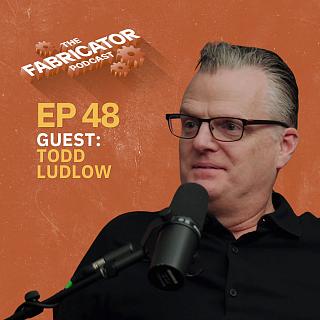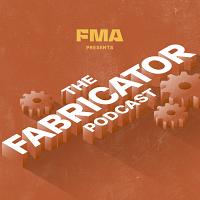Changing company culture and reaping rewards with Todd Ludlow
After Ludlow Manufacturing Inc. (LMI) received The Fabricator's 2024 Industry Award, Todd Ludlow, founder and president of the Waukegan, Ill.-based metal fabrication business, joined us on the podcast to expound on it all.
Ludlow discusses his journey of starting and growing his own fabrication business. He reflects on his early days as a machine operator and how transitioning into sales sales role helped him learn the industry. He emphasizes three important points that helped transform his business to the success it is today:
- The importance of having a strong company culture
- Giving up power to those better suited to serve the business
- An all-in approach on establishing a safe shop floor
Ludlow also discusses the impact of automation on his operations, including the use of robotic welding and parts sorting. He shares his optimism for the future and his plans for further growth, including expanding into tube laser cutting and investing in more robotic welding. He also mentions the involvement of his family in the business and the challenges and rewards that come with it.
At the top, the guys chat about a California-based welder/fabricator named Shaun Graham who was inspired enough by a previous episode to create an awesome sculpture of Garbage Pail Kids character Adam Bomb. Not to mention, he also fabricated a Michael Myers mask out of metal.
Email us at podcast@fmamfg.org with any comments, questions, or suggestions. Learn more about podcast sponsorship opportunities.
In This Episode
Learn more about the Manufacturers & Suppliers Event (MSE).
Learn more about scholarships from FMA's Nuts, Bolts, & Thingamajigs Foundation.
Learn more about podcast sponsorship opportunities.
Learn more about Ludlow Manufacturing Inc.
TRANSCRIPT
Dan Davis: Did you have any belief that you would one day be running your own business?
Todd Ludlow: I probably did in my mind, but I think it was more of a goal. I don't know if it was, "Hey, I'm prepared to run a business, because I was not prepared to run a business." I tell people all the time, "Listen, the guys I worked for who I thought made stupid decisions and they didn't know what they were doing, they were a lot smarter than I thought," and I learned that very early.
Sara Spring: Join us for the Annual Manufacturers and Suppliers event in Schaumburg, Illinois on Tuesday, March 26th. At this one day tabletop event, you'll have the opportunity to network with fellow industry professionals and discover the latest production and manufacturing processes that can drive your business. The event will kick off with a keynote speaker from the Federal Reserve Bank of Chicago. Visit fmamfg.org to learn more.
Dan Davis: Hello and welcome to another episode of the Fabricator podcast.
Lincoln Brunner: Yet another.
Dan Davis: Yes, today's episode we have Todd Ludlow of Ludlow Manufacturing out of Waukegan, Illinois. His company won the Fabricators Industry Award for 2024, and pretty nice conversation with someone who has a growing company and experiencing a lot of success.
Lincoln Brunner: A lot of success, and just a really interesting mind that he brings to his business.
Dan Davis: Yeah. I think people will enjoy the conversation, but before we jump into it, we'll just say hello, Lincoln Brunner.
Lincoln Brunner: Howdy.
Dan Davis: How are you doing?
Lincoln Brunner: I'm doing great, man. How are you?
Dan Davis: Good. Gareth Sleger is here today.
Gareth Sleger: I am.
Dan Davis: Brandon Geier, our technical producer. I don't know if we shout him out enough. Good job, Brandon. So in a previous episode of the Fabricator podcast, we had our friend Josh Welton from Brown Dog Welding. He was joined by our coworker, Rafael Guerrero of the Welder, and they chatted with Greg Davis of Redbeard Garage, and during that conversation there was a reference made to Garbage Pail Kids.
Lincoln Brunner: And lo and behold-
Dan Davis: Yeah, served as a little bit of inspiration for listener to the podcast, Shaun Graham out of the Bay Area, who is a welder-fabricator by trade, who decided, "Hey, I'm going to make a metal fabrication of my favorite Garbage Pail Kid."
Gareth Sleger: We had no idea we were going to inspire a full Garbage Pail Kid sculpture revolution.
Lincoln Brunner: How could you know that.
Dan Davis: So not only Inspire, but Shaun is very good at what he does.
Gareth Sleger: Yeah.
Dan Davis: As opposed to us, hosting podcasts. So, he's the midst of it. He's getting close to completion. He's to the point where I don't know if we ... yeah, as this conversation is taking place, you'll be able to see something, but Adam Bomb has a big hole in his head, and we're at the stage of the project where I think Shaun is working on the epoxy mushroom cloud.
Gareth Sleger: Yeah, he wants to-
Lincoln Brunner: It's not complete without an epoxy mushroom cloud.
Dan Davis: Of course not, but it looks pretty sharp
Gareth Sleger: And he wants to put LED lights in there, so there's some sort of illumination coming out of the head.
Dan Davis: Yeah, so I don't know, maybe we can drum up some early interest amongst the garbage pail-
Lincoln Brunner: Community.
Dan Davis: Yeah, yeah. Maybe they're out there saying like, "Wow, I want a 3D rendering of my favorite Garbage Pail Kid." So yeah, Shaun's work on Adam Bomb is going to look pretty sharp, right?
Lincoln Brunner: Yeah.
Gareth Sleger: Yeah, he's got a lot of posts on his Instagram, @thedrivenweldor.
Dan Davis: Yeah. What's his handle?
Gareth Sleger: @TheDrivenWeldor
Dan Davis: There you go. So check it out. He gives quite a few updates of the process.
Lincoln Brunner: Shout out to Shaun if you want to bring that to FABTECH.
Dan Davis: Yeah.
Lincoln Brunner: Please do.
Gareth Sleger: If you find yourself in Orlando, Shaun.
Lincoln Brunner: If you find yourself in Orlando. We would love to see you with Adam Bomb.
Dan Davis: You could probably fly on a plane with Adam Bomb in your lap. He's about the size of a two-year-old.
Lincoln Brunner: That's True.
Gareth Sleger: I was just talking to him before we started recording and I said, we're going to send him a T-shirt. So if you make a sculpture inspired by this conversation, we'll send you a T-shirt.
Dan Davis: We'll send you a T-shirt.
Lincoln Brunner: Yeah.
Gareth Sleger: The amount of effort that it takes on their end and the amount of effort it takes for us to put a stamp on a shirt.
Lincoln Brunner: The disparity is kind of should-
Dan Davis: Let the audience know that you actually hand sew each of those T-shirts. That's true. Well, check out Shaun Graham, and we appreciate his skills-
Gareth Sleger: Very much.
Dan Davis: Yeah, he does other things too.
Lincoln Brunner: He does other things.
Dan Davis: There's a 3D replica of Michael Myers mask.
Gareth Sleger: Yeah. It's frightening.
Dan Davis: Which is both useful and artistic.
Gareth Sleger: It's a little bit more scary than just the, I don't know, synthetic rubber or whatever.
Dan Davis: Yeah, I'm imagining there'll be a time where Halloween 22 will be out and they might have a need for a metal mask.
Lincoln Brunner: Yeah, so-
Gareth Sleger: I feel like every time they come up with a new one, they're always like, this is the last one and then-
Lincoln Brunner: They could work one more end.
Dan Davis: Yeah, I saw a clip where it was a clip from one of the Halloween movies where Michael Myers is patiently turning left at an intersection. I don't even know what the reference was. It was just very funny. Here's a killer and he's just going to take his time and obey the traffic law.
Gareth Sleger: What are the moments of his everyday life, right?
Dan Davis: Exactly.
Gareth Sleger: Like grocery shopping. Anyway.
Dan Davis: Anyway, so yeah, so thank you, Shaun, for the work in sharing your updates with us, and we'll give that T-shirt out to you, and if you have any comments or want to give us a shout-out, please do. You can reach us at ... here we go, I'm going to do it earlier, podcast@fmamfg.org.
Gareth Sleger: Perfect.
Dan Davis: And you're going to enjoy this episode with Todd Ludlow of Ludlow Manufacturing.
Sara Spring: It's that time of year, again, time for all students pursuing a manufacturing related degree in a two or four-year program to apply for a scholarship from FMA's Foundation, Nuts, Bolts & Thingamajigs. Eligible students can receive up to $3,500 per year for their program. Applications for Fall 2024 are being accepted until March 31st. Get all the details and apply today at fmamfg.org. And now, back to the episode.
Dan Davis: Today's guest is Todd Ludlow. You might know him from the pages of the fabricator. He is our 2024 industry award winner and also founder and president of Ludlow Manufacturing Inc. in Waukegan, Illinois, thanks for joining us today.
Todd Ludlow: Thanks for having me. Yeah.
Dan Davis: So how's your life changed since being the industry award winner?
Todd Ludlow: I get more text messages from friends, I think giving me crap, but-
Lincoln Brunner: Bonus. It's always a bonus.
Dan Davis: Did they consider you one to be a cover candidate for a magazine?
Todd Ludlow: I don't know if they do. I don't know if ... at the time I really did.
Dan Davis: Yeah, we were doing the story. I think the point was made that it wasn't so much about you, but kind of the people you work with and the people that make up Ludlow Manufacturing. Did you get that expected buzz or kind of excitement with your coworkers?
Todd Ludlow: Yes, we did. We got a lot of requests for magazines, which is probably the first time ever. You have to get that many magazines. So yes, we definitely saw the buzz out in the shop and in the office. I think there's a lot of people very proud of it. I know I am.
Dan Davis: Yeah. That's cool. So we'll get into some of the reasons why we thought Ludlow Manufacturing was worthy of the industry award, but can you give us an idea of how you got started in the business?
Todd Ludlow: Yeah, so in ... gosh, I got to remember back that was so long ago, '92 actually, I got my start in the business running a laser at night for a local shop that my uncle happened to be good friends with the owner and started from there, ran lasers at night, probably for about eight months. Worked a day job also and then, was lucky enough to find a job that paid me as well for ... I didn't have to work 18 hours a day and got some really good sales experience and then-
Lincoln Brunner: It's better for marital bliss if you're not working two jobs.
Todd Ludlow: Yes. Yes and then, got called back by him and said, "Hey, I know you got sales experience. Come help me grow." So was able to help them grow quite a bit from '95 to 2000, and then left on my own to rep for a couple of people. In January of 2005, decided to strike out on my own and try it.
Dan Davis: Yeah. What was it like to jump into sales for a metal fabricator? What went through your head? Did you have a game plan coming into it?
Todd Ludlow: I had absolutely no game plan.
Lincoln Brunner: What went through your head?
Todd Ludlow: So really it was, he handed me the Illinois Manufacturers Guide, the Wisconsin Manufacturers Guide and said "Go cold call." So that's what I did for a very long time.
Lincoln Brunner: Was that intimidating at first?
Todd Ludlow: No, because the sales training I had been through before, that's what most of it was about, was learning to deal with no.
Lincoln Brunner: Yeah.
Todd Ludlow: And if you can't deal with no, then you probably should do something else other than sales.
Lincoln Brunner: Then, you should say no to sales. What was it like ... I'm just hopping back really quick, now that it's germane to much of anything, but what was the wattage on that first laser you're using in '92?
Todd Ludlow: 1500 watt.
Dan Davis: That's actually pretty powerful.
Todd Ludlow: HD Mitsubishi. Yep.
Lincoln Brunner: So when you went into sales was the thing that you just ... what were some things you discovered about the business that you maybe didn't know before you went into full-time?
Todd Ludlow: Really at that time, so it was really different because laser cutting was just coming on its own in '95. I know it started back in the 80s, but you didn't see a lot of laser shops. So at first, it was very difficult just because I didn't know who the customers were and who'd call on. And then, after about a good nine months or so, you start seeing who the customers are and it was ... for a while there, you could fall out of the door and find work, it doesn't mean you're going to get it, but you could find it easily. Did not know how fast-paced it would be at all. Had no clue, all the changes, different parts, schedule changes, all the things. I was not used to working in sales for a manufacturing company who had their own product line. They drove all that. I didn't drive that. I had nothing to do with it. It was just go out and sell it. So coming into a fabricator, as you probably know, it changes every day and that was a big challenge. It really was.
Lincoln Brunner: Sure. Sure.
Dan Davis: Did your background operating a laser help you any in terms of getting ahead of the curve when it came to sales?
Todd Ludlow: Yeah, it did because I knew, at least ... I knew enough to be dangerous. I'll say that, yeah. I still went back to the owner a lot and said, "Hey, let's go make calls. I need help." And he knew more about laser cutting than I would ever know at that point in time in my life, and I got to learn a lot. I was very lucky. I had a couple of people that I either worked a rep for who were really good in our industry, very smart guys know what they're doing and was able to take a lot from them.
Dan Davis: Can you kind of repeat the story that you shared with us as we were talking for the article for The Fabricator? What kind of motivated you to want to start your own business?
Todd Ludlow: When I was independent repping, we were back in the time material prices going up fast and we were one of the first ones in at a major OEM and thought, "Oh boy, this is going to be a challenge." And it was a challenge, but the biggest thing was basically having someone make a decision that wasn't my decision and it was the wrong decision and we no longer were in that OEM. Several months later we were gone and now, I had to start all over again and it was, well, if I'm going to start all over again, let's figure out something different.
Lincoln Brunner: Yeah.
Todd Ludlow: And I wanted to make the decisions, right or wrong. I still wanted to make them and it would be my fault for making them.
Dan Davis: Right. Did you have any belief that you would one day be running your own business?
Todd Ludlow: I probably did my mind, but I think it was more of a goal. I don't know if it was, "Hey, I'm prepared to run a business," because I was not prepared to run a business. I tell people all the time, "Listen, the guys I worked for who I thought made stupid decisions and they didn't know what they were doing, they were a lot smarter than I thought." And I learned that very early, very early.
Lincoln Brunner: Yeah, kids and parents, right?
Todd Ludlow: Yes, yes. When they're 16, you don't know a thing.
Lincoln Brunner: And then, they turn 22, suddenly you're a little more savvy.
Todd Ludlow: Well, that was pretty good if that 22 then started believing, so you did a better job.
Lincoln Brunner: That is optimistic. Yeah, I couldn't think of it.
Dan Davis: So how'd you end up ... what were the steps taken to get Ludlow Manufacturing off the ground?
Todd Ludlow: I would say this. I'm not the great planner. I'm not. So if you asked me for a business plan, I'd probably chuckle at you. It's the same thing with call reports and stuff, I never did any of that stuff. I tended to believe if I was doing my job and I was selling and I was making you money, if I'm not, then have the conversation and probably you should fire me. So I tend to believe that motivation and going out and risking some money is great motivation and it forces you to go out and work and to say I had no plan would not be completely the truth, but was everything on paper and I had this great big thing to go to the banquet? Absolutely not. No.
Lincoln Brunner: Tactically, it sounds like you had your act together.
Todd Ludlow: Yeah, I knew what mattered and that was getting orders, and I still believe that today. I mean, it sits behind me in my office that I think it's Sam Walmart who said, the only who can fire you is your customer, and I believe it, 100%.
Dan Davis: So really, you had a line on work even before.
Todd Ludlow: Yeah.
Dan Davis: Maybe you had the equipment to kind of do it. Yeah.
Todd Ludlow: I mean, I knew where the customers were from working in the industry, and like I said, my first job, he gave me a manufacturer's guide, so I got pretty good at looking things up and figuring out who was outsourcing and who was not outsourcing. So it wasn't that hard to go find the work, at least go call the customer. It was difficult getting work.
Lincoln Brunner: Hustling intelligently can pay off pretty well.
Todd Ludlow: Yes.
Lincoln Brunner: Yeah.
Dan Davis: What type of early work did you take on?
Todd Ludlow: My gosh, we took anything and everything. I'll be honest with you. We made point of purchase display parts. We made parts for laundry equipment, just about anything you can think of. If it was work in front of us, we took it. We'd move everything out in the morning and bring it back at night.
Dan Davis: Is this the small shop you had?
Todd Ludlow: The small shop, yeah. I don't do that anymore, thank God. No.
Lincoln Brunner: Logistically, how would you move equipment in and out of that facility?
Todd Ludlow: It wasn't the equipment, it was just parts. It was material-
Lincoln Brunner: Just parts. Got it.
Todd Ludlow: It was having room to continue to do the job. We had this point of purchase display we made that was three foot by three foot. Well, when you're an 1100 square feet and you have to make 300 of those-
Lincoln Brunner: Yeah.
Todd Ludlow: The math doesn't add up.
Lincoln Brunner: No, not at all.
Dan Davis: No need to call in a Feng Shui expert.
Lincoln Brunner: Get it out of my house
Todd Ludlow: Yes. Get it out quickly.
Lincoln Brunner: Yeah.
Todd Ludlow: Yep.
Lincoln Brunner: Well, can you kind paint the contrast for us, Todd, in terms of what was it like starting out in that dinky facility and then, your first big expansion to 12,000 square feet or so?
Todd Ludlow: Honestly, I thought I was in a football stadium and I honestly thought we'd never move again. And 12 months later we went to 18,000 square feet and I think 14 months after that, we took another 12,000 square feet and then, we took the building across the street from us. So we expanded pretty quick, but the challenge was trying to keep production going at the same time of expanding or moving. We were really lucky, and I credit ... there's a couple of guys at the shop who did a wonderful job of moving us into the building we're currently at. We had three record months in a row in the middle of a move.
Dan Davis: What was the timeframe on that?
Todd Ludlow: What time?
Dan Davis: Yeah, when did that happen?
Todd Ludlow: 2013.
Dan Davis: Okay.
Todd Ludlow: Yeah, end of '12 into '13. So I think if you're well organized, it's not hard to move, and if you have some good people who really put the effort and timelines and all that stuff, all the stuff I'm not good at.
Lincoln Brunner: Well, that's sort of the key, isn't it? You find people to complement your skill set and you run with it. I'm really curious about conversation we were having previous to tape roll and was the difficulties of growing that quickly? What are some things that present themselves right away that you perhaps maybe weren't-
Todd Ludlow: So we had grown from two million to five million pretty quickly, and operationally it was tough. And then, when we did that great big growth a couple of years ago, it was even tougher. I mean, just trying to keep all the parts moving through the shop, the timelines. We started to see that our ERP was not as robust as what it should be and switched ERPs, people's a ... everyone has that same challenge, but I really think operationally and trying to keep things moving was the toughest part. When you go with that kind of growth, there's just a lot of moving parts. We really struggled with it. Would I tell you our on-time delivery was great during that timeframe? No, it wasn't bad, but it wasn't great.
Lincoln Brunner: What was it about the people aspect of it that you found challenging?
Todd Ludlow: Finding, keeping, because of course the market was changing and we were pretty lucky. As I mentioned, we had a couple of companies around us who had metal fabrication divisions that were slowing down and they had laid off some people, so we were able to pick up a bunch of people, which really helped, who had some experience. And then, we tried, we bought our first robotic bending cell, that really helped us.
Lincoln Brunner: Okay. Yeah.
Todd Ludlow: We had a job they were running. We had five people running all the time in day and night. And put a robot cell in and it was down to two people.
Lincoln Brunner: Okay. Okay.
Todd Ludlow: That made a big difference, but how do you get all that work through your shop so quickly, you're trying to squeeze a lot of work through a really small timeframe.
Lincoln Brunner: Yeah, sounds like it.
Todd Ludlow: And it's tough.
Dan Davis: Yeah, so that kind of sets the stage, kind of entering the pandemic, where you had close to 100 employees around that time, and kind of describe to us what the pandemic was like for Ludlow and then some of the changes that started to occur after that.
Todd Ludlow: It was scary as hell to be honest with you. Why so? Just not knowing what was going to happen.
Lincoln Brunner: Sure.
Todd Ludlow: Not knowing if we were going to have to shut down. We were lucky to have some customers in industries that needed to stay open, so we got to stay open. That helped a lot. And then, I always call it luck, but we were in the right place at the right time for a couple of really good jobs that we grew that first year of COVID, which I never thought we'd grow. I thought it was going to be mass late. We had one quarter where it was like, "Oh boy, this is going to be tough." And we dropped a number of people down and then, from then on, it was just growth.
Lincoln Brunner: So you had to drop to what, about 80 people?
Todd Ludlow: About 80 ... no, we were down to full-time. We were down to 71 people.
Lincoln Brunner: Okay.
Dan Davis: So did you take on new customers during that year?
Todd Ludlow: One new customer and one existing customer was going berserk in the medical industry and that helped a lot.
Dan Davis: Right.
Todd Ludlow: They didn't have the horsepower to put all that out. They just didn't.
Lincoln Brunner: Right.
Todd Ludlow: And we were there and we had capacity and we were already a vendor and we understood their quality. We understood what they wanted.
Lincoln Brunner: You were open.
Todd Ludlow: We were open.
Dan Davis: Yeah.
Todd Ludlow: Yes, we were open. That really is what sets the stage for us to grow.
Lincoln Brunner: Absolutely.
Todd Ludlow: And then, we just added customer, customer, customer. We added probably eight new customers over a year, which is a lot depending on what you're doing. We launched, I don't even know how many parts, 500, 600 new parts. And constantly looking at new customer base helps us. Not that I want to get rid of my existing customers. Now, I don't ever want to do that, but we need to keep growing.
Dan Davis: Yeah, so around this you've had some new blood join the organization and they're started to begin an investigation of formalizing some processes.
Todd Ludlow: Yes.
Dan Davis: And you mentioned new customers and that was kind of part of it as well. Can you kind of touch upon that and describe how the seeds have changed, started to not only be planted, but start to germinate from there?
Todd Ludlow: Well, we had talked about culture and how we were doing things. I don't think our culture was the best prior to COVID.
Lincoln Brunner: Why do you say that?
Todd Ludlow: It just wasn't a lot of bickering. Unfortunately, I tell people it starts at the top. I wasn't raised that way. I was raised to go do it, get it done and move on. That's the way I was raised. It's a little different now. I'm going to say it's a little different, but I think it's a lot different now. I'm being polite. Now, culture matters a lot.
Lincoln Brunner: Yeah.
Todd Ludlow: It's not only the hours they work, it's not only the money. It's what are the things? Are people happy? Do we have a clean shop? Some of the things that we rolled out to change, we do monthly luncheons, we do a summer picnic, we do a Christmas party, and we just seen the employee change. And then, I think culture is, you have ... I've said it out to you before, you've got that 80/20 rule.
Dan Davis: Yes.
Todd Ludlow: Converting some of the 20% or 5%, whatever it is, over to employees who have a good attitude and want a good culture. That's what we worked for, but it was really hard.
Lincoln Brunner: That's a challenge for anybody, right?
Todd Ludlow: Still, and to give you a road map exactly of how we ... our HR department did a lot of that. They're really good at it.
Lincoln Brunner: Sure.
Todd Ludlow: My wife runs all of HR. She has somebody who reports to her, but she definitely understands what the employees are looking for and talks to them, and that's ... one of the things I pride myself is when I get in the morning, I walk the shop, I want to see everybody. And I think that's part of the culture. It should be.
Lincoln Brunner: Managed by walking around.
Todd Ludlow: You can see a lot walking around.
Lincoln Brunner: Yeah, that's an old maxim for a reason. I'm really curious about how it is as a business owner, you've been able to navigate, the tremendous amount of change that you've seen just not only in terms of culture, but the business itself.
Todd Ludlow: I mean, there's no doubt, it's been a challenge, but I think hiring people has helped a lot.
Lincoln Brunner: Yeah.
Todd Ludlow: Giving up some of the power has helped a lot, that let go thing. I don't think you ever fully let go as an owner. I don't think you do.
Lincoln Brunner: Can you? I mean-
Todd Ludlow: I don't think I can. I don't think that's my personality.
Lincoln Brunner: Sure.
Todd Ludlow: There's things I don't want to do, and once they were off my plate, I realized I don't want to do those anymore.
Dan Davis: What were some of those things?
Todd Ludlow: Just the day-to-day operational stuff I just didn't want to do anymore. Not that I don't understand it. I do. There are people who are a lot better at it than I am. I'd rather go out and make sales calls and deal with the business side of it more than day-to-day stuff.
Lincoln Brunner: Well, there's a whole school of thought, but absolutely just concentrating on your strengths, right?
Todd Ludlow: Yep.
Lincoln Brunner: Do what energizes you and find people who are energized by doing the things that you don't like to do.
Todd Ludlow: Yeah. I mean, for example, bringing Chris on in quality, that was a huge win for us. It got us organized in certain things, things we were not doing. It used to be when a customer come in for an audit. We were always going, "Gosh, are we going to pass? Are we going to pass? Are we going to pass? Does everyone have all their information? Is it all right there in front of you?" To be honest with you, I don't even really think about it now.
Dan Davis: Yeah.
Lincoln Brunner: What a load off, right?
Todd Ludlow: Yes. Yeah, and that was with new customers coming in a lot. That was a lot to think about.
Dan Davis: I think you used the phrase, it's made it easier for you to kind of sell, which I imagine something is what you've always done and something you look forward to doing.
Todd Ludlow: Yeah, I love that part of it. That's the part I like. I like going to see customers.
Dan Davis: Yeah.
Todd Ludlow: I think traveling can sometimes get old, but I enjoy that part and I enjoy still making cold calls. I don't mind hearing. No, it doesn't bother me.
Lincoln Brunner: Did you keep that old book?
Todd Ludlow: No. I got a new book. Yeah. No, I have a new book now. There's too much on this. You don't even need a book anymore.
Lincoln Brunner: Nope. Yeah. It's the mobile book.
Dan Davis: You mentioned Chris, and although it was kind of a quality focused discussion, but in a way that new jobs are brought in and the team is pulled together, there's conversations happening with different departments and that gets filtered down. So in a way, that process kind of became a mechanism to kind of get everybody on the same page. Is that still working for you?
Lincoln Brunner: Yes.
Dan Davis: Were you kind of surprised to see type of effect through such a ... I don't want to call it a simple exercise, but kind a common sense and necessary exercise?
Todd Ludlow: Yeah. I freely admit that. Yes. It surprised me, and once it was going, it was like, "Okay, this makes sense."
Dan Davis: Yeah.
Todd Ludlow: And now, it's, "All right. We need to do more of it." And that's the next stage is, all right, what's next for us? What else do we bring on board? What process do we bring? Chris is in charge also the safety council.
Dan Davis: And are we still up like a thousand?
Todd Ludlow: Yeah. Knock on wood, wherever it is. Yeah. Yeah, we are. And that really helps, it does and we talk about it. We talk about it with the employees. Our last monthly luncheon, we talked about the fact that, "Hey, look at how long we've gone."
Lincoln Brunner: Right. Well, when you don't have an OSHA reportable problem puts people at ease, right?
Todd Ludlow: It does. It also puts it at ease of, we all know if you listen to the news where the insurance companies are going, it seems like every day they're going up and up and up and up and up and up, and who knows where it's going to stop. If you can hopefully keep your mod low for your workman's comp, that's a big help.
Lincoln Brunner: Absolutely.
Todd Ludlow: And then, when you have the insurance audits, when they come in and see what you're doing, we just had one. So I was very pleased with what they said. And I'd like to say, "Oh, that's me." It's not. It's the people. Again, management and the guys in the floor.
Dan Davis: Yeah. A sheet metal shop is like a sneaky place where injuries can occur, especially if you're not thinking about it, whether it's cuts or in places running a forklift. And I know I've stood on many a pallet I shouldn't have been on, but when you're 5'9 in a land of Midwest giants, you want to get a look over their shoulders to be able to have-
Lincoln Brunner: What's that like?
Dan Davis: It was, I don't like being 5'9 but being in a shop where you've had ... I mean, it's more than a thousand days without the reportable incident. I mean, there's a certain pride that you took in it. I mean, that was the one thing you were emphatic about. You didn't want to see and talk about it.
Todd Ludlow: Yeah, you don't want to ... it's like the no hitter thing. I understand. Yeah, knock on wood, exactly. And we do talk about it. It's just, it's more of, we don't talk about the days. We just talk about, all right, what else are we doing?
Lincoln Brunner: Well, going back to culture, what is this culture of safety and dotting the I's and crossing the T's that makes that possible. I mean, you've got people in place to do that.
Todd Ludlow: Yeah, and it's the little things. I mean, it's making sure people are doing what they're supposed to do, when they're supposed to do it.
Lincoln Brunner: Right.
Todd Ludlow: Wearing seat belts on forklifts, and we have stop signs in the shop to stop, look, don't just fly through and I understand when you're in a hurry, things like that happen, but they do a really good job of making sure they don't happen. And it's not just managers and supervisors, it's the employees also.
Dan Davis: Yeah, absolutely.
Todd Ludlow: They're the ones pushing it. Yeah.
Dan Davis: Yeah, do you consider yourself a better communicator at work.
Todd Ludlow: Yeah, than before, gosh, yes.
Dan Davis: Right. Did you used to be more of a kind of down-the-chain-of-command type of communicator or is it just-
Todd Ludlow: No, I've never been that way.
Dan Davis: Okay.
Todd Ludlow: I've always went out and there's not a lot of filter with me.
Dan Davis: So it's just my way of the highway type thing.
Todd Ludlow: Yeah, and that doesn't work.
Dan Davis: Yeah.
Todd Ludlow: It's not really that way anymore. There's certain things, equipment, no. I will buy the equipment.
Dan Davis: Right, right. Sure, that's once again, an extension of stuff you like.
Todd Ludlow: It's what I like. And I also believe that if I buy the wrong thing and it doesn't work, I only have one person to be mad at, it's myself. So I really don't want to be mad at somebody else.
Dan Davis: Yeah. No, I think that's fair. So in terms of capacity through your shop, can you give us a before-and-after what it's like before the pandemic and since the pandemic?
Todd Ludlow: Beginning of pandemic, we definitely had capacity. From then until, gosh almighty, I would say six months ago, we were always rushing around and the market is changing a little bit. We've seen things soften a little bit, but we have a lot of capacity now. We've added more equipment, we've added more automation. We added parts sorting, and we ran a couple jobs through it and we were all like, "Oh my gosh, we really can make a lot of parts really fast," and get them out the door really fast.
Lincoln Brunner: Has that automated, the automation and the part sorting been sort of the biggest technological leap of late for you?
Dan Davis: Yes. Yeah.
Todd Ludlow: And it's still, I think it's going to be three months before we get it down.
Dan Davis: Okay, sure. What are some of the challenges?
Todd Ludlow: How to pull parts out of the skeletons? What to do with the skeleton? Yes, exactly. That's the biggest challenge, and you have to look at every part and then, understand what to do with it.
Dan Davis: So you're almost rethinking your whole laser cutting process.
Todd Ludlow: Yes. Now, it's, "Hey, the laser didn't run," so we didn't sort it because the sorting was slower than the laser. I don't care.
Dan Davis: Yeah.
Todd Ludlow: I don't want to count parts. It's expensive. There'll be certain jobs that yes, we don't sort, because they won't sort real well. Yeah, if they're really small and things like that, we'll cluster them and sort the cluster but I want to sort everything I can and I don't think we'll buy another laser without sorting.
Dan Davis: Yeah. How many people do you have involved in preparing nests for the laser cutting machine?
Todd Ludlow: One.
Dan Davis: So it's not a lot of in-depth training. It's just-
Lincoln Brunner: A lot of software.
Todd Ludlow: A lot of software, but I give him credit. He's out there videotaping or looking at his NASA and looking at how they sort and looking how they're putting on the pallets below and spending a lot of time going, all right, next time we're going to do it this way.
Lincoln Brunner: Well, for a lot of people, that sort of still is the black box, how to do that well, consistently.
Todd Ludlow: There's not a lot of people doing it.
Lincoln Brunner: Right.
Todd Ludlow: There's not.
Dan Davis: And the machine tool manufacturer can't lean on a non-existent customer base to get best practices. So their early adopters kind have to figure it out on their own.
Lincoln Brunner: Congratulations.
Todd Ludlow: Yeah. I mean, I think, on that side of it, we are definitely not one of the earliest ones, that's or sure. I mean, we're still fairly early, but there's some other people who've been doing it for a few years, which is just shocking that there's companies out there doing it that long.
Dan Davis: You see that as kind of a competitive advantage?
Todd Ludlow: Yes.
Dan Davis: Yeah.
Todd Ludlow: I mean, when we peaked out between two shifts during the week and a weekend shift, I think at one point we had almost 17 people sorting parts.
Lincoln Brunner: Which speaks well for your output, but at the same time, it's a lot of hourly costs.
Todd Ludlow: A lot of hourly cost.
Dan Davis: Well, kind of tied to that, you have that 20 kilowatt laser.
Todd Ludlow: Yeah, we have 20 and 15 with sorting.
Dan Davis: Has that done anything to improve edge quality?
Todd Ludlow: Yeah.
Dan Davis: So maybe you're not deburring as many-
Todd Ludlow: We don't deburr as much. We don't. I think everyone gets all hung up on the speed and speed and only speed. I'd much rather have a really nice edge, even if I only ran it at 90% of what its capabilities are, I'm fine with it.
Lincoln Brunner: Saves on reject rates.
Todd Ludlow: Yes, it does.
Dan Davis: It's kind of crazy, the edge quality on some of that thicker stuff.
Todd Ludlow: It's amazing how fast it's come along, from my three kilowatt, that's from 2012-
Dan Davis: It was only supposed for a lot of thin parts, right?
Todd Ludlow: It's amazing how fast it's just ramped up. It seems to be slowing down from the standpoint of how much bigger they're getting, but I don't think you're going to see the same ramp from two kilowatt to 30 like you will from 30 to whatever it's going to go to. I just don't.
Lincoln Brunner: Right, and forgive me for not doing my homework, were those fiber lasers using ... and what have you found in terms of late with the improvement in fiber laser capacity? What has that done for your part quality and what has it done for your throughput?
Todd Ludlow: If you'd have a hard time filling us up with laser work, it would be really difficult. I would say that, that's what I've noticed. I'm sure there are people out there who could fill me the great big OEMs, but I still think it's really difficult to fill it. And then, you throw sorting into it and I can run it overnight. We pick up that much more, so the throughput really, it's so much better.
Lincoln Brunner: So it make it easier to sell with that kind of-
Todd Ludlow: Yeah, it does. It does.
Dan Davis: Does it open the door to maybe clients you haven't really been as aggressive pursuing?
Todd Ludlow: Yeah. I mean, I would say that I've always pursued them, but I don't think that we were big enough. Didn't have all the processes in place. And now that we have what I'd call most of it in place and are getting bigger, it's definitely opened doors to companies that never-
Dan Davis: Do you see a future for plasma cutting shops? And I realize they do stuff like four inches and stuff, but I'm talking about now, if you can cut inch, inch and a half pretty efficiently-
Todd Ludlow: Just plasmas are so much cheaper in all honesty.
Dan Davis: Yeah. I mean, I see the star.
Todd Ludlow: But I can see it being laser cut up to two inch plate.
Dan Davis: Yeah, I just see if there's more shops investing in that type of high-powered laser, theoretically they'd have more capacity. And if they're looking to fill it, I don't know, it's interesting to see how the technology that was once only dedicated thin sheet now is kind of-
Todd Ludlow: Dominating the thick.
Dan Davis: Right, and taking post-processing out of the picture.
Todd Ludlow: Yeah, it is, and that's why I say the growth of it and how fast it's ramped up is unbelievable.
Dan Davis: Yeah.
Todd Ludlow: It really is. I wish the press break industry would have the same growth and ramp up in it. I don't see it-
Dan Davis: Yeah. Is it just because the nature of the process you think or not enough minds have applied themselves?
Todd Ludlow: I think that it's amazing, because if you look at lasers and they've all ... they probably wouldn't admit it, but most of them have kind of taken bits and pieces from other machines they've seen.
Dan Davis: Sure.
Todd Ludlow: So you don't feel like they're redesigning the wheel or I think with robotic press breaks, it seems like they all want to put their own little spin on it. What works, leave it. I mean, why reinvent it?
Dan Davis: Right.
Todd Ludlow: And that's something that I think that they want and I think that that's why it is further behind. That's my opinion.
Dan Davis: Yeah.
Lincoln Brunner: Interesting.
Dan Davis: They're able to process more the machines and with the right operator, but in terms of being that plug and play kind of automated thing, still ways to go in your house-
Lincoln Brunner: Especially with thicker material.
Todd Ludlow: Yeah. It's still a ways to go. It is. Fiber lasers make it easy. When you were using C02s, you had to really know something about cutting. Not that you don't have to know anything about cutting with fiber, that's not what I'm saying, but it was far more difficult with CO2s, it just-
Lincoln Brunner: To do it well.
Todd Ludlow: Yes, to do it well, to be known as, "Hey, I've really good cut edge, good quality." That was difficult. That was really difficult.
Lincoln Brunner: Monitoring wattage and the assist gas. Yeah.
Todd Ludlow: Yep. How clean you keep things. There's a lot that goes into it. Now, you can throw a fiber laser on my floor and I can be running in, if they can build it in three days, I could be running in three days.
Dan Davis: Yeah, very interesting. After you had to wait six months. Yeah. It's a little bit better though, right?
Todd Ludlow: Yeah. That's been an industry struggle, that's for sure.
Dan Davis: Yeah. So you've made the statement when we chatted for the story. I mean, you're a big proponent of automation. We've kind of talked about parts sorting. Do you see welding automation coming along at maybe a little bit more successful clip?
Todd Ludlow: Yeah, we've definitely added a lot of robots the last couple of years. We went from two to ... we have eight now.
Dan Davis: Yeah.
Todd Ludlow: So we'll have more coming.
Lincoln Brunner: Are they cobots or are they fully automated?
Todd Ludlow: We're going to order our first one here shortly to bring on for just welding. It won't be for anything else, because I don't ... in welding, if you put it inside of a cell, you can run it at full speed, on a press break, unless you put it inside of a cell, you can't. And a lot of people are not putting them inside cells, and I tend to believe that our people are still faster than a cobot. The robot, maybe. It's close, but it keeps running. It makes up for it. Cobots, I think they have a future, there's no doubt, but it all depends on what people are going to do with them and how they're going to utilize them.
Lincoln Brunner: Right.
Todd Ludlow: They are fairly inexpensive compared to a robotic bending cell, let's say, but they're definitely not as productive, not even close.
Dan Davis: Do you have an idea how you might be using yours or are you just getting it to experiment?
Todd Ludlow: I'm getting it to experiment with a lot of things. Mostly on the welding side, getting weld parameters for our robots, but then doing lower volume, quick changeover parts, parts that have a lot of weld on them that tend to beat up on the guys. And now, all they have to do is load it in the fixture and hit that button and go, and they might have to put it in two different fixtures, but it's still going to be easier on them.
Lincoln Brunner: Especially for those repetitive tasks that they may not enjoy doing-
Todd Ludlow: Yep.
Lincoln Brunner: For 10 hours.
Todd Ludlow: You can weld 50 pieces on a robot. It's not a problem if you have a fixture, right?
Lincoln Brunner: Right.
Todd Ludlow: I tend to believe that works better on a cobot, but even though there's guys doing thousands of pieces on cobots and there are, they're not as fast though. They're not even close to being as fast as one of our cells. We've run the same parts and timed it out and went, "All right, what do we get more of?" We've got a good part from all of it, but it's definitely not as fast.
Dan Davis: So it's interesting you mentioned having that cobot behind guarding to maximize it. I've never seen anyone do that. Do you feel they're competitive with maybe a low payload robot or definitely you think it's faster than any welder-
Todd Ludlow: I think more and ore people are going to be doing it. There's a lot of companies who are putting cells around them and they're not elaborate cells.
Dan Davis: Right.
Todd Ludlow: They're very simple, but I think it depends on what kind of parts you're doing too. If they're great big parts, you can't put one around, of course not, right?
Lincoln Brunner: Right.
Todd Ludlow: If you're doing small parts or you're doing testing like we're doing, I think it definitely makes sense without a doubt.
Dan Davis: Sure.
Todd Ludlow: And you can build your own cell. You don't have to have them build it. You could do it yourself if you know how to do that.
Lincoln Brunner: Be your own integrator.
Todd Ludlow: Yes. I don't want to do that.
Dan Davis: Do you have an automation expert who kind of takes this on or is this-
Todd Ludlow: Group effort.
Dan Davis: Okay.
Todd Ludlow: Yeah. I've got three people welding, who understand how to program robots.
Dan Davis: That's kind of exciting.
Todd Ludlow: So a cobot is a lot. They walked me through it last week when I went to the demo.
Lincoln Brunner: Yeah. Use your iPad and there you go. Yeah.
Todd Ludlow: It was much more simple.
Dan Davis: So it's kind of cool, the welders involved instead of an engineer driving. Do the welders have any hesitation or did they show kind of excitement to take this on?
Todd Ludlow: Yeah, I mean, I think the best people to program robots for welding are welders. Yeah. They understand it.
Lincoln Brunner: They understand the parameters. They understand what can and cannot be done.
Todd Ludlow: Yep.
Lincoln Brunner: Yeah.
Todd Ludlow: Yeah. I mean 100%, that's who I think should be doing. Not that an engineer can't do it or could start it, but I think ultimately somebody in the welding department has to look at it.
Dan Davis: From where you are now and where you first started off, did you have any idea you'd be operating a business of this size?
Todd Ludlow: No. No clue.
Dan Davis: Yeah.
Todd Ludlow: No clue. I always wanted to get it to that 20 million market and go, okay, that was the hurdle and took a long time to get there but no, I mean, I wanted that, but I don't want to be one of these great big conglomerates and own 40 different shops or have 2000 people. That doesn't really excite me, and there's other guys who are really good at doing it, so let them do it.
Lincoln Brunner: Well, then you couldn't make all the cold calls. You'd be too busy.
Todd Ludlow: Couldn't do that. Couldn't decide what equipment to buy, because I tend to believe when you're that big, there's no way you know what you're buying as the owner or CEO, there's no way.
Lincoln Brunner: Very difficult.
Todd Ludlow: Very difficult, and I tend to believe you better know what you're buying. Yeah.
Lincoln Brunner: Yeah.
Dan Davis: It's quite a testament. I mean, you're actually producing more parts, making more revenue than when you did with more people before the pandemic.
Todd Ludlow: Yeah. Definitely, without a doubt.
Lincoln Brunner: What do you attribute that to?
Todd Ludlow: Part mix, number one. So bringing new customers, number two, getting everyone to pull on the same side of the rope. That was a big one. And of course, the third one being automation. Just because I didn't have part sorting, I still had automated lasers, and our first job we ran across the 15K was so much faster than what we could do on three and six. So we had already seen how fast. My gosh, we can cut a truckload of steel in a day instead of three days.
Lincoln Brunner: Literally.
Todd Ludlow: Yes. Yeah, bringing on the robotic bending opened up a whole new door for us.
Dan Davis: You've been able to bring on more customers as well.
Todd Ludlow: Yeah.
Dan Davis: And doing it more efficiently. There's a lot of pistons firing as they should.
Todd Ludlow: Moving at the same time. Yeah, it's amazing. It really is.
Lincoln Brunner: Are you talking the same breadth of customer mix that you had early on when you were taking anything and everything?
Todd Ludlow: No. Gosh, no. We were probably ... let's see here, it's got to be six years ago, seven years ago. We were probably 80% lawn and garden.
Dan Davis: Okay.
Todd Ludlow: We're not even close to that anymore. We've grown the business, which helped a lot. And one customer we parted ways with, which was great for both of us, which is good, but growing the customer base is what really changed.
Lincoln Brunner: Okay.
Todd Ludlow: And we didn't want anyone that deep into us ever again.
Lincoln Brunner: Okay, got it.
Todd Ludlow: But it's hard to say no, right? It is really hard to say no.
Lincoln Brunner: The risk, of course, is that one industry takes a dive and you're left holding the bag.
Todd Ludlow: They sneeze and you feel it for two years.
Lincoln Brunner: Well put.
Todd Ludlow: Yeah.
Dan Davis: What have been some of the new segments that you've successfully courted?
Todd Ludlow: Truck, trailer, fire equipment, a little bit of RV, generators are just a few of them. And then, agricultural, more of it, a little bit more construction work than we did before.
Lincoln Brunner: You talking structural?
Todd Ludlow: No, construction equipment. Tractors. Yes.
Lincoln Brunner: Got it.
Todd Ludlow: Yeah, so it's definitely moved itself out from just being one or two industries focused to nine or 10 industry focused, which definitely makes easier to sleep at night.
Lincoln Brunner: Yeah. I bet it does.
Dan Davis: What type of revenues are you looking for this year?
Todd Ludlow: I hope to be up 5%, to be honest with you. It's what I hope to be. I think the market is changing. I think it is slowing down a little bit. I think you had the great big Amazon bubble of all the conveyors and all the vehicles and everything else.
Lincoln Brunner: All the warehouses.
Todd Ludlow: Warehouses and all that other stuff that ... for what 18 months just kind of stopped and now it's starting to come back. So I think the second half of the year, even second quarter, is going to start to pick up and it's going to be strong in the second half, without a doubt.
Dan Davis: Are you bullish in the near term, beyond 2024?
Todd Ludlow: Gosh, if I could say that, that would be wonderful, but I can't even think about ... I mean, my customers are saying, yes. We're seeing it good.
Lincoln Brunner: It's encouraging.
Todd Ludlow: I think interest rates will make a difference. And we have this wonderful election coming.
Lincoln Brunner: I don't know if that's the word I would use.
Dan Davis: Katie, bore the door.
Todd Ludlow: Yeah, exactly.
Dan Davis: Yes.
Lincoln Brunner: Well, we're still feeling the lag from the interest rate hikes, right? We're still dealing with a little bit of that, still delayed response.
Todd Ludlow: Yeah, you are and equipment is becoming more expensive to buy because you have that higher interest rate.
Lincoln Brunner: Yeah.
Todd Ludlow: So that's going to change things.
Lincoln Brunner: Yeah.
Todd Ludlow: What it holds in the future, I wish I knew that would be great, but as I tell my guys, we just got to keep moving forward working harder and trying to improve.
Dan Davis: Is there anything on the wishlist that you have. You maybe put in your Amazon shopping bag?
Lincoln Brunner: Shopping bag. There you go.
Todd Ludlow: That's a loaded question, my wife would tell you. Yeah. I mean, next for us is probably something some day into tube laser cutting, more robotic welding. Our machine shop is really growing.
Lincoln Brunner: Yeah.
Todd Ludlow: It's really grown the last couple of years, and I tend to see that growing even more.
Lincoln Brunner: Very good. That's what Dan had mentioned in his article. I'm kind of wondering what now at this stage in the ball game, sort of a higher view, what still keeps you going in the office excited?
Todd Ludlow: I still like talking to customers.
Lincoln Brunner: Yeah.
Todd Ludlow: I enjoy that. I really do. Seeing what challenges we have now, they keep you on your toes. They're tough days, but most of the time it is really good, and having people you work with that you really like and work hard.
Lincoln Brunner: That helps.
Todd Ludlow: Makes a big difference.
Lincoln Brunner: Yeah.
Todd Ludlow: It really does.
Dan Davis: And you're kind of in interesting position now that the second generation is kind of entering. What's the dynamic like there.
Todd Ludlow: They don't report to me, which is a good thing probably for them and myself, but it's a challenge bringing your family in or working with family. That's always a challenge. It is. My oldest is one of the assistant plant managers, and my middle son is doing IT work for us, learning a lot. I think that they see it as a lot of ours to do this, whether it'd be me or somebody else in the company, but it's got its challenges, and I think the biggest thing I look for is how do they work with others and they work really well.
Dan Davis: Yeah.
Todd Ludlow: And they do.
Lincoln Brunner: That's great.
Todd Ludlow: They get along with people. It's not, "Hey, my parents own it."
Dan Davis: That's got to make you feel good, right?
Todd Ludlow: That's what you want.
Lincoln Brunner: Yeah.
Todd Ludlow: That's what you want. It is.
Lincoln Brunner: It's got to also kind of be a nice little tacit pad in the back for yourself, right, like, "Hey, I did something right here."
Todd Ludlow: Yeah. I probably give more credit to my wife.
Lincoln Brunner: Well, that because you should, right. We all understand that's where the credit really belongs, right?
Todd Ludlow: Yep. Yeah. Yeah. It is. Where the credit goes.
Dan Davis: Did they show an interest in joining the company or is it something that you said was kind of there if they wanted to?
Todd Ludlow: I think they did. I wanted them to work somewhere else for a couple of years, at first, and they both did that. And I really think they want to do it. They just didn't know the timing. For my oldest, it was perfect timing. And for my middle, he was in a good job with a large company here in Chicago, and they weren't moving him where he wanted to go, and I needed somebody to take over IT. And I said, all right, this is what's open. We know you want to go to that path, so come here and do it.
Lincoln Brunner: Cool.
Todd Ludlow: So whether he stays with us, that's going to be up to him. I want them to do what they want to do.
Dan Davis: Yeah. Does family conversation now resolve or revolve around work stuff all the time?
Todd Ludlow: No. Sometimes, there are days, of course.
Dan Davis: Right.
Todd Ludlow: We try to shut it off. We're empty-nesters now.
Lincoln Brunner: It feels doesn't it.
Todd Ludlow: It feels really good, yeah. It does. We try not to talk about it after 6:00, but prior to this, yeah, it was the conversation every day, all day, 24 hours a day, which really gets old.
Dan Davis: Right.
Lincoln Brunner: Yeah.
Dan Davis: The only thing worse is being married to a math teacher.
Todd Ludlow: If you're married to a math teacher, I have a feeling you might be in trouble.
Lincoln Brunner: My daughter is.
Dan Davis: Luckily she only listens to podcasts of celebrities. It's excellent. Yeah, she's into celebrity autobiographies now.
Todd Ludlow: There you go. Yeah.
Dan Davis: It's nothing like hearing Barbara Streisand in your house for a week. She didn't have the earbuds in. It's kind of unsettling.
Lincoln Brunner: I haven't had that experience. We'll talk about that another time.
Dan Davis: There you go. Well, anything in the future outside of equipment you see for your business?
Todd Ludlow: I can see us expanding. I can.
Lincoln Brunner: Out of Waukegan or-
Todd Ludlow: Yeah. Yeah. Maybe something down south, maybe something in a different state.
Dan Davis: Interesting.
Todd Ludlow: I think it's tough to grow all in one facility. It is, and customers are starting and they have forever, but some of our customers now are asking about it. So it's something that we could see potential. Whether or not I ultimately want to do it, it might be a different story, but I can definitely see it, especially with all the consolidation in our industry that's happening. I think that's a big deal.
Lincoln Brunner: Well, and you've got the movement of a lot of customers going to the Southeast.
Todd Ludlow: Yep.
Lincoln Brunner: A lot of industry, right?
Todd Ludlow: Yet, they're still buying from the Midwest.
Lincoln Brunner: Right.
Dan Davis: Right. What do you think the story is there, is it quality?
Todd Ludlow: I don't know if I can be honest and say it.
Dan Davis: This is the place for it.
Todd Ludlow: Yeah. This is the place for it. Yeah. Where thousands of my friends will go, you're-
Dan Davis: Only 10% of the audience get to this point, right, in the podcast.
Todd Ludlow: I think it might be capacities number one.
Dan Davis: Sure.
Todd Ludlow: I think that's a big deal. It really is.
Lincoln Brunner: Well, you've had a lot of years to build that up.
Todd Ludlow: Yes, we have, and we bought it at the right time. Buying at the beginning of the pandemic or middle of pandemic was good timing. It was lucky to need to get rid of two CO2 lasers and just biting the bullet and going, "Oh my gosh, this is giving away kittens." You couldn't give them away and you almost like you're paying to take it away and just biting a bullet and going, you know what, we're going to do it. It is what it is.
Lincoln Brunner: Well, and Lord knows the vendors needed the business. Yes.
Dan Davis: Well, they couldn't get stuff to their customers though.
Todd Ludlow: Nobody could get anything.
Lincoln Brunner: Control systems and ...
Todd Ludlow: It was unbelievable. I've never seen anything like it. I don't know if we'll ever see anything like that again.
Lincoln Brunner: I had a German vendor tell me 18 months. This was 2022, but they were waiting for control system parts 18 months.
Todd Ludlow: 18 to 24 months is what I've heard people wait on certain things. Yeah.
Lincoln Brunner: I can't believe it.
Todd Ludlow: And it was a challenge for everybody in the industry. All the machine tool manufacturers had that challenge, and if they said they didn't, they were not telling the truth. I'm wondering where we're going to go next. You're starting to see a lot of different equipment manufacturers coming in the United States. That's going to be the next challenge, I think.
Dan Davis: Yeah. Whether it's Turkish manufacturers have been here for a while, Spanish Portugal, but now, starting to see more of these folks from Asia.
Todd Ludlow: Yep.
Dan Davis: You see it in FABTECH, Mexico where, I mean, most of the laser companies represented are Chinese. And you start to see a little bit of it at FABTECH, but it's definitely a different dynamic.
Todd Ludlow: Yeah, it would be interesting to see what they do with quite honestly the price. That's about ... I worry about it, is it going to become where they're not trying to advance the technology. And as long as they keep doing that, I think we'll be fine. I really do because all the major manufacturers are good. They all make good equipment. They do.
Lincoln Brunner: Yeah. It's the whole Canon and Nikon dynamic. You can't go wrong with a lot of them.
Todd Ludlow: Exactly. It's who you like, right? Then, there's features of course, but I think they all make decent equipment. They do.
Dan Davis: Is connectivity an issue or a desire that you have for your equipment?
Todd Ludlow: Yeah, we have to. It's one of the reasons why we stick with the Bystronic Lasers and Bystronic brakes, because they're all connected.
Lincoln Brunner: They have their own internet of things.
Todd Ludlow: Yes.
Dan Davis: You surprised, we haven't seen more movement on that from the different machine tool, vendors in the fabricating marketplace. I mean, I understand why, but you figure it sooner or later, they would have to capitulate.
Todd Ludlow: You'd think that sooner or later they'd have to realize that you're going to have to play nice in the sandbox together at some point.
Dan Davis: Yeah.
Todd Ludlow: You can't do it all. I'm sure the big players think, "Oh no, we can do it all." No, you can't do it all, because you can't get the people, and you're not going to get everyone away from whatever manufacturer. You're just not going to. It would be nice if they did. It would definitely make things more helpful. I guess for us, we base it on, can we pull the information from it, and then what do we do with that information? Can we put it back in Excel spreadsheets? Can we use something like Power BI to generate reports? Those are the things we're looking at. So then that way we're not tied just to one manufacturer, right?
Lincoln Brunner: Well, you need one data set of business information, right? You got to have that in order to move yourself forward.
Todd Ludlow: Yeah. Well, without it, I mean information ... yeah, the equipment is great and it matters. It's fast automation's coming on, but the information is what really matters, and is it good information.
Lincoln Brunner: Is it real business intelligence, or is it just data.
Todd Ludlow: It's even to the point where if everyone is clocking in and out of the jobs properly, the information is so easy?
Lincoln Brunner: Sure.
Todd Ludlow: That's nice for you. It's tough when they don't because the information is not always up to date.
Dan Davis: Right. When you say clocking in, it's out of jobs.
Todd Ludlow: Yeah. Actual jobs. It's a challenge in our industry.
Dan Davis: Yeah. Training bar codes or-
Todd Ludlow: Bar codes punch in whatever.
Dan Davis: Yeah, still a challenge.
Todd Ludlow: It's still a challenge. You have the people that wait until the end of the job to punch in and out or do it in the beginning, so we've been working on now automating some of that process and then also, giving visual computer screens or TVs up in each department.
Dan Davis: Yeah.
Todd Ludlow: To show are they clocked in to a job currently? Are they not clocked in? It's not that they're not working. It's nothing to do with that.
Lincoln Brunner: Right.
Todd Ludlow: It's, are we getting the data at the right time? If they're halfway through the job, it's great to know that.
Dan Davis: Yeah. I think everybody can relate to that. Your head gets somewhere else and you just forget the one step that it's probably not that, didn't seem that important.
Todd Ludlow: Exactly. Yeah.
Dan Davis: Yep. Yeah, that's an issue.
Gareth Sleger: You were talking about shifting the mindset of culture in the shop. Did that include trying to find a new way to recruit workforce?
Todd Ludlow: Yeah, and I will say it's very difficult. Everything we've done, I mean, we've used LinkedIn, we've used Facebook, Instagram. You name it, we've used it. We're starting to do the internship with the local college, working with the high schools. The thing I worry about is if you bring these kids in and you're not prepared, or all you do is you park them in front of a press break or a spot welder, they get bored and they leave.
Dan Davis: So they're not only ... they have a bad taste left from the employer, but also maybe the industry.
Todd Ludlow: Yes.
Gareth Sleger: You don't want to be that shop that turns them away.
Todd Ludlow: No, and it's not about ... I mean, it's great. I'm not going to lie. It's great having 25 kids on your floor, that quite honestly, you don't pay the same as what you do. My guy who's got 15 years experience, but at the same time, I don't want to push them out the door.
Gareth Sleger: Yeah, it's a lot of turnover.
Todd Ludlow: It's a lot of turnover, and that's not what we're looking for. I still have, my gosh, the original five, original six. I have three.
Dan Davis: After how many years?
Todd Ludlow: '18, start of '18.
Dan Davis: That's kind of impressive.
Todd Ludlow: We still have a lot of employees that have been with us 10 plus years.
Dan Davis: You seem like you have a good mix. I mean, a lot of young faces too.
Todd Ludlow: We do, but my young faces are 30 now. They've been with me since '18.
Dan Davis: It does happen. Yes.
Gareth Sleger: It happens to all of us.
Todd Ludlow: Yeah. They look younger and younger and I look older and older. It's amazing how that works. Waiting for that to reverse where I just look old, now they're gaining one me. It hasn't happened.
Dan Davis: Are you one of those Ted Williams tubes.?
Todd Ludlow: Exactly.
Dan Davis: You figure that out, you can get out of the fabrication-
Todd Ludlow: Cryogenics.
Dan Davis: It just break you out for a company meetings.
Todd Ludlow: Exactly.
Dan Davis: I do love technology. I'm just throwing that out there.
Gareth Sleger: Are you comfortable Todd? Are you okay? Okay.
Todd Ludlow: Now you got Dan going.
Dan Davis: Yeah. We're two minutes from me starting to talk about heads in fishbowls. Anyway, so on that note-
Gareth Sleger: It's like working with organizations like Great FMA.
Todd Ludlow: Yeah, of course. FMA has been great. I like the camps. I like what they're doing there. The FMA is doing a much, much, much better job of advertising it, making sure people know about it, which helps companies like mine, and I wish we could do more of it, and it looks like it's being added more and more around it, this local area, which is nice to see.
Dan Davis: And you kind of walk the walk as well in terms of your relationship with College of Lake County.
Todd Ludlow: Yeah.
Dan Davis: And Lake County, Illinois.
Todd Ludlow: Yeah. I mean, I tend to believe we owe it to give back to it.
Dan Davis: Yeah.
Todd Ludlow: Without the industry, we wouldn't be where we're sitting.
Dan Davis: There's a certain kind of pride there too, because I mean, you're a product of that educational system or you're not.
Todd Ludlow: Yep. That is my schooling. College of Lake County.
Dan Davis: Be true to your school. Lancers forever. That's all I got in terms of local community college mascots. Were they always the Lancers?
Todd Ludlow: Always the Lancers.
Dan Davis: That's interesting.
Lincoln Brunner: What is a Lancer?
Dan Davis: It's the Poke-Stick from the night.
Lincoln Brunner: The Poke-Stick. Yeah. Okay.
Todd Ludlow: Poke stick. At least you didn't call it Poke-Man.
Dan Davis: Right, right. The Poke-Stick. The Pikachu. I know you're heavily involved with Pikachu conversations with your younger employees.
Todd Ludlow: Yeah. There you go.
Lincoln Brunner: On that note.
Dan Davis: Yeah, on that note. Yeah. That's about it. So congratulations on your industry award.
Todd Ludlow: Thank you.
Dan Davis: Continued success.
Todd Ludlow: Thank you for having me. We appreciate it.
Lincoln Brunner: It was great to have you.
Dan Davis: Yeah. I think our conversation lets people know that as we were talking about our Nuts, Bolts and Thingamajigs Foundation, that the first job is just the beginning and whether it's sales, which I don't think we've ever really had a person speak about sales as a career path within metal fabricating, but certainly it's an important one.
Todd Ludlow: It's a good career.
Dan Davis: Yeah, you meet a lot of people-
Todd Ludlow: It's a great career.
Dan Davis: Yeah.
Todd Ludlow: If you're good at it financially, it's a really good career. Yeah.
Dan Davis: And I think that's kind of when people talk about success financially in this industry, that's what they need to keep in mind. It's not just laying down the same beat every day. It's the next step and then, the next step after that. So thanks for sharing that.
Todd Ludlow: Anytime.
Lincoln Brunner: Great to have you.
Todd Ludlow: Thank you for having me.
Dan Davis: So reach out to us if you have any questions, comments, recommendations, complaints, fan letters, Christmas wish items. Reach out to us at podcast@fmamfg.org. Please tell all your friends and family about this podcast. Thank you and good night.
Sara Spring: The Fabricator Podcast is a production of Fabricators and Manufacturers Association located in Elgin, Illinois. The show is hosted by Dan Davis and the staff of FMA Communications. The podcast is produced by Gareth Sleger and recorded and edited with the help of Brandon Geier. Sales support provided by Andy Flando. Additional production support by Elizabeth Gavin, Dana Wiker, Mary Diamond, Mike Owens and me, Sara Spring. Thank you for listening.
ABOUT THE FABRICATOR PODCAST
The Fabricator Podcast brings you conversations with people in manufacturing who make things out of metal. We speak with manufacturers, metal fabricators, welders, job shop owners, small business entrepreneurs, artists, marketers, educators, and more. Host Dan Davis also goes beyond discussing just manufacturing and the skilled trades, and chats about pop culture, current events, food, music, movies, comedy, and, of course, robots. The Fabricator Podcast is presented by the Fabricators and Manufacturers Association.
We shape the conversation around metal.
Host: Dan Davis
Producer/Editor: Gareth Sleger
Video Producer/Editor: Brandon Geier
Ad writer/spokesperson/social media: Sara Spring
Additional video editing: Dana Wiker
Graphics: Billy Kulpa
Marketing support: Elizabeth Gavin, Mary Diamond, Pat Simon
Sales support: Andy Flando, Amy Hudson
Web support: Mike Owens, Jared Carlow
Additional support: Ed Youdell, Maurine Semevolos, Lincoln Brunner, Tim Heston, Rafael Guerrero, Josh Welton, Darla Welton, Amanda Carlson-Hicks, Callie Check, Rick Lehnhardt, Judy Steinbach.
Where to listen to The Fabricator Podcast:
Follow The Fabricator:
Where to Listen
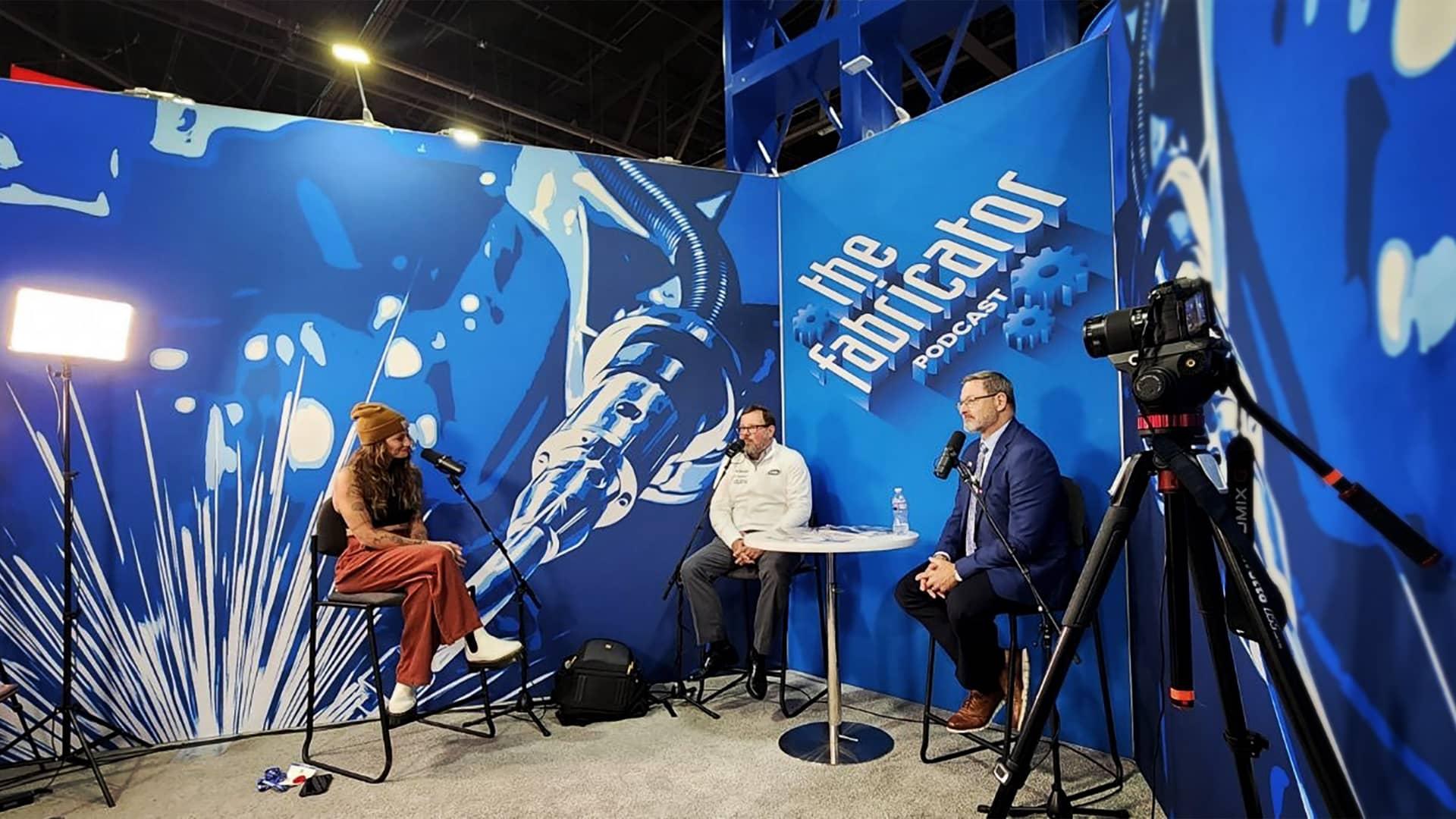
About This Podcast
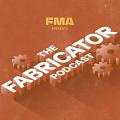
All Episodes
-
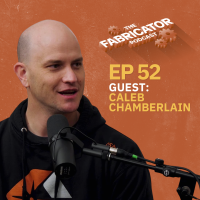 Ep. 052
Ep. 052 -
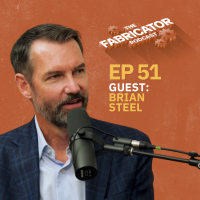 Ep. 051
Ep. 051 -
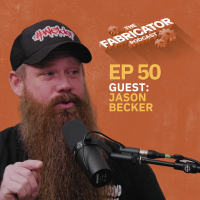 Ep. 050
Ep. 050 -
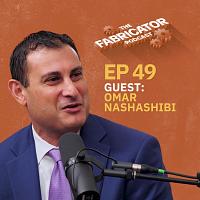 Ep. 049
Ep. 049 -
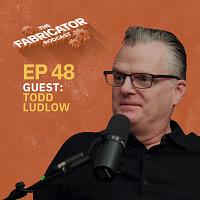 Ep. 048Changing company culture and reaping rewards with Todd Ludlow
Ep. 048Changing company culture and reaping rewards with Todd Ludlow -
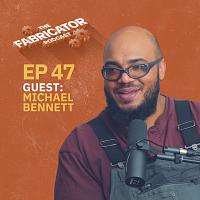 Ep. 047
Ep. 047 -
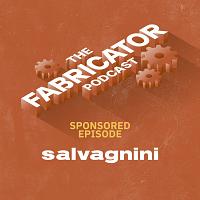 Bonus
Bonus -
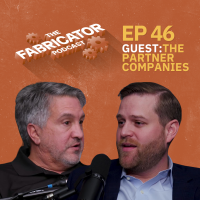 Ep. 046
Ep. 046 -
 Ep. 045
Ep. 045 -
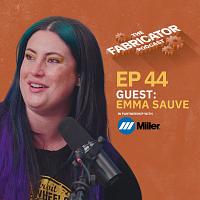 Ep. 044
Ep. 044 -
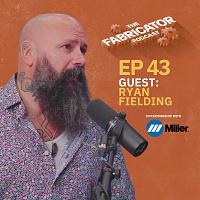 Ep. 043
Ep. 043 -
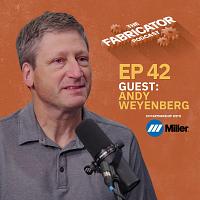 Ep. 042
Ep. 042 -
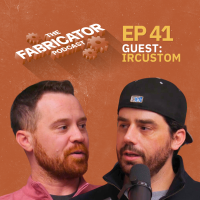 Ep. 041
Ep. 041 -
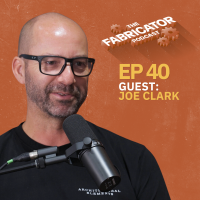 Ep. 040
Ep. 040 -
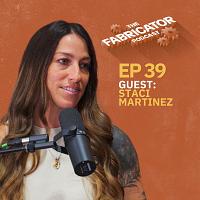 Ep. 039
Ep. 039 -
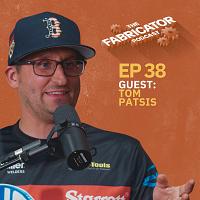 Ep. 038
Ep. 038 -
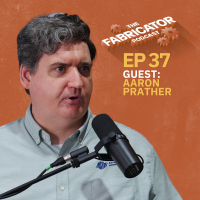 Ep. 037
Ep. 037 -
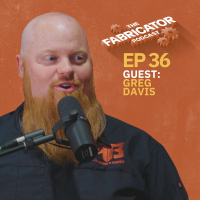 Ep. 036
Ep. 036 -
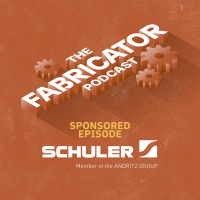 Bonus
Bonus -
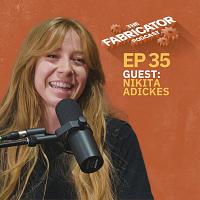 Ep. 035
Ep. 035 -
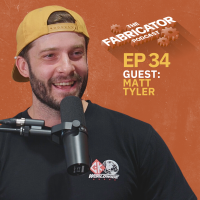 Ep. 034
Ep. 034 -
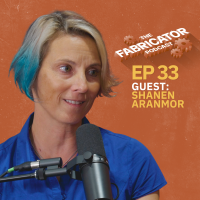 Ep. 033
Ep. 033 -
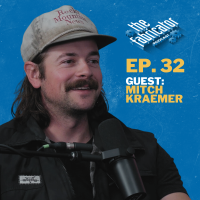 Ep. 032
Ep. 032 -
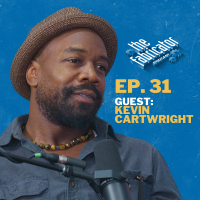 Ep. 031
Ep. 031 -
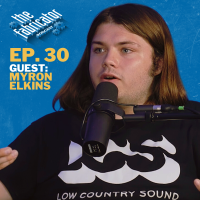 Ep. 030
Ep. 030
























